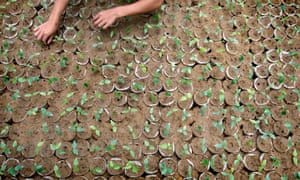Add A New Concern to Climate Change: Global Greening
"A 30 percent increase in photosynthesis does not translate into a 30 percent increase in strawberries off the land."
"While photosynthesis does pull carbon dioxide out of the atmosphere, much of that gas goes right back into the air. The reason: At night, the chemical reactions in plants essentially run backward. In a process known as respiration, plants pump out carbon dioxide instead of pulling it in.... Part of the story is that photosynthesis is going up, and part of the story is that so is respiration."
"Every year we build more power plants, and every year the plants take out more C02."
"Plants are quietly scrubbing the air of one China's worth of carbon. What frightens me is knowing this can't go on forever."
"If respiration catches up with photosynthesis, this huge carbon reservoir could spill back into our air."
Elliott Campbell, environmental scientist, University of California, Santa Cruz

The bad news of course is what has been repeated time and again by those warning of the dread consequences of climate change, no longer referred to as global warming. Who in today's world is ignorant of the fact that weather situations have erupted that have been more of everything; more extreme in every conceivable way; hotter, wetter, drier, visiting catastrophic hurricanes, flooding, wildfires, drought, volcanic eruptions, more frequent earthquakes. The polar ice caps are melting, gigantic glaciers are breaking up, sea levels are rising, agricultural crops are failing.
In June, Johan Uddling of the University of Gothenburg, Sweden and colleagues suggested that the acknowledged rise in carbon dioxide has resulted in an increase in the rate that soil microbes take up and use nutrients, leaving plants bereft of the vital nutrients they need to thrive. By general consensus, scientists agree that plants remove a quarter of the circulating carbon dioxide that rises into the atmosphere resulting from industrialization's energy use -- and the cost of producing and using it is the diminution of environmental health.
Plants have been busy as vegetation is wont to do, scrubbing carbon dioxide out of the atmosphere in lock-step with rising emissions. The result is a greener planet. Described fittingly enough, as "global greening". But scientists are also urging caution over celebration; that carbon dioxide levels in reality continue to soar over the past two centuries' records. We are only just now in the past several decades beginning to fully understand how that rise is impacting the planet. For one thing, since 2010, the six warmest years on record have been noted.
Dr. Campbell's study, published a year ago, places these concerns into perspective, pointing out that the planet's energy use is responsible for emitting close to 40 billion tons of carbon dioxide annually. Smaller studies suggest that human activity contributes hugely to the situation leading to an increase around the world in photosynthesis. And photosynthesis is the transformation of energy from the sun to energy for plant growth and production. All to the good...?
The question appears to be: how good? After all, plants are now converting 31 percent more carbon dioxide into organic material than before the Industrial Revolution. Many take the figures that Dr. Campbell's research team published as verification that increased carbon dioxide is a plus for the world: "The best messages are positive: C02 increases crop yields, the earth is greening", exulted Joseph Bast, chief executive officer of the Heartland Institute.
While Dr. Bast's takeaway from Dr. Campbell's conclusions seems reasonably deduced, Dr. Campbell is less than pleased with what he views as an incorrect perception leading from his research. While farmland is producing more food than a century ago, he feels the additional carbon dioxide spewed into the atmosphere is only part of the reason. Photosynthesis is responsible for pulling carbon dioxide out of the air, but a substantial portion of the gas returns to the atmosphere in nightly-occurring respiration.
 |
| Natural vegetation absorbs about a quarter of the carbon emissions created by burning fossil fuels. Photograph: Kuni Takahashi/Getty Images |
Additionally, Dr. Campbell and his think-alike colleagues, not knowing how long global greening will continue, point out that as temperatures rise and rainfall patterns change, the possibility that vegetation may no longer pull in extra carbon dioxide is a future potential. In which case even the amount of carbon dioxide, estimated at one-quarter of the circulating atmospheric carbon -- that plants now consume, will no longer be the case at some future date.

Labels: Atmosphere, Bioscience, Climate Change, Environment, Nature

0 Comments:
Post a Comment
<< Home